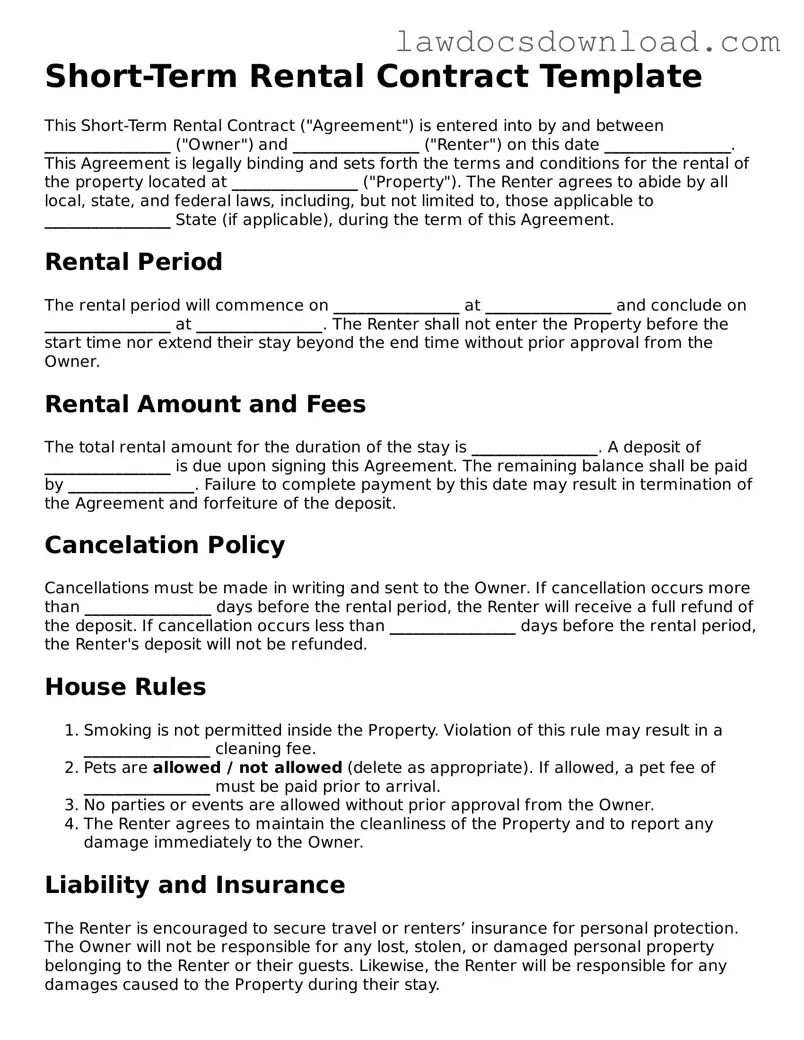A Lease Agreement shares significant similarities with a Short-Term Rental Contract, with both establishing a temporary occupancy arrangement. The fundamental difference lies in their duration; while a short-term rental typically spans weeks or days, a lease agreement often covers a longer period, usually several months to a year. Both documents detail the obligations of the renter and the property owner, rules regarding pets, subletting, and repairs, along with specifying payment terms and security deposit requirements.
A Vacation Rental Agreement is very like a Short-Term Rental Contract but is specifically tailored for properties rented out for vacation purposes. It often includes detailed clauses about check-in/check-out procedures, minimum stay requirements, and house rules specific to the vacation experience, such as noise restrictions and usage of recreational facilities. This agreement also addresses cancelation policies due to its transient nature.
Hotel Stay Contracts share a transient occupancy purpose with short-term rental contracts but apply to commercial establishments. Unlike short-term rental agreements, which involve renting entire homes or apartments, hotel contracts cover the provision of a room, with added services such as housekeeping and room service. Payment terms in hotel stays are also typically on a per-night basis and include taxes and fees not commonly detailed in short-term rental contracts.
A Sublease Agreement, similar to a short-term rental contract, involves renting out a residential property. However, in this case, the individual renting out the space is not the owner but rather a current tenant looking to sublet the space temporarily. Both agreements outline the terms of occupancy, rent, and utilities, but a sublease also requires approval from the landlord or property management, as stipulated in the original lease agreement.
The Room Rental Agreement is akin to a short-term rental contract, focusing on the rental of a single room instead of an entire property. Commonly used in shared housing situations, this agreement outlines the renter’s rights to specific areas of the property (the room being rented and possibly certain common areas), and it details rules regarding guests, noise, and shared responsibilities. Both contracts establish the term of the rental, though room rental agreements might offer more flexible terms.
A Commercial Lease Agreement shares the foundational concept of renting property with a short-term rental contract but is used for commercial, rather than residential, purposes. This type of lease covers the renting of office spaces, warehouses, or retail locations, including more complex terms regarding renovations, signage and branding, and compliance with commercial zoning laws. Payment structures in commercial leases also may include a percentage of business profits, unlike the fixed-rate terms usually seen in short-term residential rentals.
An Equipment Rental Agreement parallels the short-term rental contract in its temporary provision of assets, but instead of real estate, it focuses on personal property, such as machinery, vehicles, or electronics. Both agree on a term and conditions of use, including maintenance and repair responsibilities. However, equipment rental agreements uniquely address depreciation, insurance coverage, and return conditions.
A Property Management Agreement echoes the intentions of a short-term rental contract by specifying terms under which a property will be cared for and rented out. However, it is between a property owner and a management company rather than a tenant. The document outlines services the manager will provide, such as tenant screening, rent collection, and maintenance, and details the manager’s compensation, offering a more hands-off approach for the property owner.
An Event Space Rental Agreement, while oriented towards short-term use similar to short-term rental contracts, is exclusively for locations such as banquet halls, conference centers, or outdoor venues. It details the period of rental, setup and cleanup responsibilities, a detailed list of permitted and prohibited activities, and often includes stipulations about catering, alcohol, and noise. The focus is on the event itself rather than a residential stay.
The House Sitting Agreement, though not a rental in the traditional sense, shares common ground with short-term rental contracts in determining the temporary use of a property. It typically doesn't involve a payment exchange for stay but outlines the responsibilities of the person staying in the home, such as pet care, maintenance, and security measures. This agreement provides peace of mind to the homeowner, while the house sitter enjoys short-term accommodation, akin to the benefits of a short-term rental.

